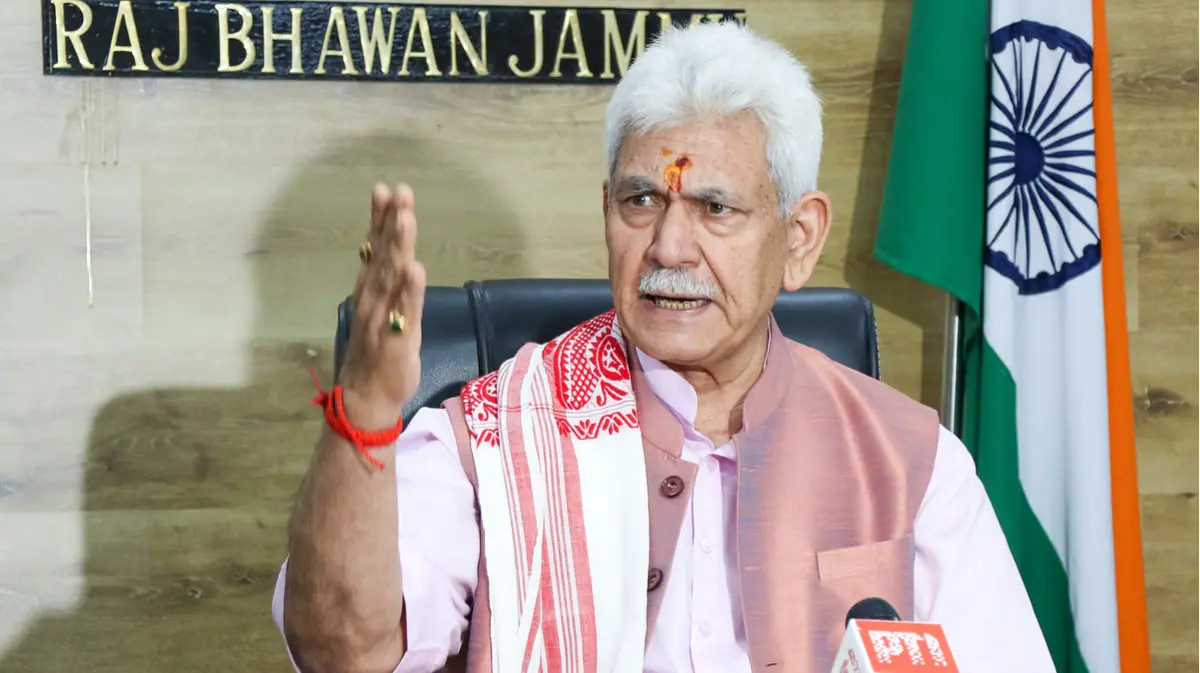Updated 10 April 2025 at 21:44 IST
Betrayal Busted: J&K LG Crushes Anti-National Mole Network
The Lieutenant Governor of Jammu and Kashmir on Thursday ordered the dismissal of two government employees for their involvement in anti-national activities.
- India News
- 4 min read

Jammu: In a decisive action aimed at reinforcing its zero-tolerance policy towards anti-national elements within the government machinery, the Lieutenant Governor of Jammu and Kashmir on Thursday ordered the dismissal of two government employees for their involvement in anti-national activities.
The action was taken under Article 311(2)(c) of the Constitution of India, which empowers the government to terminate services of public servants without holding an inquiry, in the interest of the security of the state.
The dismissed employees include Basharat Ahmad Mir, an assistant wireless operator in the Jammu and Kashmir Police (JKP), and Ishtiyak Ahmed Malik, a senior assistant in the Public Works (R&B) department. Both individuals were found to be deeply involved in activities threatening national security and aiding terrorist networks, as per credible inputs from intelligence and law enforcement agencies.
Basharat Ahmad Mir of Upper Brein in Srinagar, had been under surveillance of intelligence agencies for his continued contact with Pakistan intelligence operatives
Advertisement
Officials revealed that Mir was involved in systematically transmitting classified intelligence related to security establishments and the deployment patterns of joint forces to hostile entities across the border. His communications with Pakistan-based intelligence handlers were not sporadic, but sustained and deliberate, raising alarms across multiple intelligence agencies.
As a technically trained wireless operator within the JKP and stationed at a strategically crucial location, Mir was entrusted with access to real-time operational data. Rather than fulfilling his sworn duty to safeguard the nation, he exploited his position to funnel sensitive information to enemy networks, thereby compromising national defence protocols.
Advertisement
“His betrayal wasn’t incidental, rather it was calculated and continuous,” said an intelligence officer. “He operated as an insider threat, using the uniform of a police official to shield a deeply embedded allegiance to anti-national forces,”.
Investigators reveal that Mir’s communication methods were sophisticated and encrypted, indicating a higher level of training and ideological commitment.
Officials believe his disclosures could have potentially aided cross-border infiltration attempts, targeted attacks on security infrastructure, and endangered lives of personnel operating in high-risk zones.
“This was not just a violation of service rules, this was an act of sabotage against the nation," they added. “The extent of damage caused is still under evaluation, but preliminary findings suggest his actions had the potential to disrupt vital security operations,”.
In another case, Ishtiyak Ahmed Malik of Shitroo Larnoo in Anantnag district, was found to be an active member of the banned outfit Jamaat-e-Islami Jammu and Kashmir and a close associate of the Hizbul Mujahideen a home-grown terrorist group.
Insiders further reveal Malik, a senior assistant in the Public Works (R&B) department, systematically misused his official position to clandestinely bolster the activities of the proscribed Jamaat-e-Islami (JeI) in South Kashmir.
Intelligence wing revealed that Malik functioned as a critical enabler and ideological facilitator for Hizbul Mujahideen.
Far from being a passive sympathizer, Malik played a hands-on role in providing material and logistical assistance to terrorists, including safe houses, food supplies, and secure hideouts. He also acted as a conduit for sensitive local intelligence, particularly regarding the movement and deployment of security forces information that was used to plan ambushes, evade detection, and launch targeted assaults.
“He was not merely an OGW facilitator, he operated as a strategic bridge between the underground terror network and the overground sympathizer ecosystem,” said an official, he added further that Malik's influence extended to radicalizing vulnerable youth and recruiting them into the fold of terrorism.
He added that Malik's network helped lay the groundwork for a structured support system for Hizbul Mujahideen operations in South Kashmir. He is alleged to have coordinated with other JeI operatives to establish sleeper cells and indoctrination modules in remote villages, particularly targeting areas where law enforcement presence was thin.
“He actively contributed to creating a shadow infrastructure that aided and abetted terrorist activity. His role went far beyond providing shelter, he was shaping an ecosystem that allowed terror to flourish under the radar,” the official added.
Malik’s long-standing association with banned outfits, combined with his access to government resources and local influence, made him a particularly dangerous insider threat. Officials emphasized that his removal was essential to disrupt the nexus of radical elements embedded within government institutions.
Get Current Updates on India News, Entertainment News, Cricket News along with Latest News and Web Stories from India and around the world.
Published By : Medha Singh
Published On: 10 April 2025 at 21:44 IST
